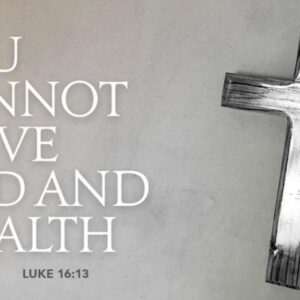Luke 16:1-13
1 Then Jesus said to the disciples, “There was a rich man who had a manager, and charges were brought to rich landowner that the manager was squandering the landowner’s property. 2 So the rich man summoned the manager and said to him, ‘What is this that I hear about you? Give me an accounting of your management, because you cannot be my manager any longer.’ 3 Then the manager said to himself, ‘What will I do, now that my master is taking the position away from me? I am not strong enough to dig, and I am ashamed to beg. 4 I have decided what to do so that, when I am dismissed as manager, people may welcome me into their homes.’ 5 So, summoning his master’s debtors one by one, the manager asked the first, ‘How much do you owe my master?’ 6 The debtor answered, ‘A hundred jugs of olive oil.’ The manager said, ‘Take your bill, sit down quickly, and make it fifty.’ 7 Then the manager asked another, ‘And how much do you owe?’ That debtor replied, ‘A hundred containers of wheat.’ The manager said, ‘Take your bill and make it eighty.’ 8 And the master commended the dishonest manager because he had acted shrewdly; for the children of this age are more shrewd in dealing with their own generation than are the children of light. 9 And I tell you, make friends for yourselves by means of dishonest wealth so that when it is gone, they may welcome you into the eternal homes.
10 “Whoever is faithful in a very little is faithful also in much; and whoever is dishonest in a very little is dishonest also in much. 11 If then you have not been faithful with the dishonest wealth, who will entrust to you the true riches? 12 And if you have not been faithful with what belongs to another, who will give you what is your own? 13 No servant can serve two masters; for a servant will either hate the one and love the other, or be devoted to the one and despise the other. You cannot serve God and wealth.”
————————
Please pray with me this morning, church:
Forgiving God,
Competing interests all demand
Our allegiance and our faithfulness.
In a time of renegotiating priorities and energies,
Remind us, again, of your faithfulness to us.
Remind us who you are
And who you call us to be.
Amen.
————————
In the Spring of 2019, I was fortunate to be able to travel to Greece and Turkey with a group based out of the Houston area. We stopped at a number of places that were instrumental in the life and ministry of the Apostle Paul. We went to Philippi, Corinth, Athens, Ephesus, Troas, among many others. One of the places we visited was Aphrodisias in what is now far western Turkey. Aphrodisias was named for the goddess Aphrodite and was home to one of the largest temples to Aphrodite in the ancient world.
Also excavated at that site is a fairly complete Sebasteion, which would have been the gathering place for worshipers of the cult of the Roman Empire. And if you were a Roman citizen, if you lived within the Roman Empire, you were expected to worship at the cult of the Roman Empire. You could choose which gods or goddesses you and your family worshiped and venerated and gave offerings to, but everyone was expected to worship the Empire, and especially, you were expected to worship the emperor, the Caesar.
The Sebasteion at Aphrodisias is so interesting because it’s so well preserved. In the marble reliefs, you can clearly see this hierarchical arrangement between servants and slaves, masters and landowners, the wealthy elite, politicians, high ranking military and imperial officials, and then at the top level, the Roman gods and goddesses and the Caesar who was seen as just under the gods, receiving his power and authority from the gods themselves.
The Sebasteion at Aphrodisias shows this hierarchy in a multi-level structure. There is no question where you fall in this hierarchy. And because you fall where you do in this hierarchy, your loyalty, your allegiance, your fidelity, belongs to those above you in this stratified structure.
Your fidelity, your faith, your trust…is demanded of you.
Enter into this reality Jesus’ words from our gospel this morning, “No one can serve two masters. For they will either hate the one and love the other, or be totally devoted to the one and despise the other.”
We’re all serving someone or something, and that’s the thing about those you serve…they demand your faith, your loyalty…your time, your energy…they demand your life. That’s the nature of the master/servant relationship.
So how do you live within a system and within a structure that demands your fidelity, as someone whose faith and loyalty is asked elsewhere, namely whose faith is asked of by God? Can you live with these competing loyalties, or do you have to choose?
These are not just questions for the early Christ-believers in the first century Roman Empire, dear church. These are very much live questions for us.
How do you live within a system and within a structure that demands your fidelity, as someone whose faith and loyalty is asked elsewhere, namely whose faith is asked of by God? Can you live with these competing loyalties, or do you have to choose?
This parable that kicks off the 16th chapter of Luke is one of the most confusing in the entire set of gospels. It only appears in the Gospel of Luke, and so much ink has been spilled by theologians and pastors and professors who are so much smarter than I am about what this parable means and what’s the correct interpretation of these words from Jesus, and truly, none of them is able to definitively say what the heck Jesus is talking about here. So many writers and commentators, including a few of my own professors from seminary, come to the conclusion that we just can’t know what Jesus is getting at here, so they offer some thoughts but they tend to all end with, “But it could be something completely different, we just don’t know.” So if you’re confused by this morning’s gospel, you’re in good company.
But I do think it’s a worthy use of our time to examine our allegiances and those things that demand our fidelity, our faith. It’s a good practice to be mindful of your time and energy and who’s demanding what of you and where you’re devoting yourself. Especially after 2 and a half years when many of us reexamined our priorities, realigned what was important to us, and renegotiated where we spent our energies. Many of you, I know, like me, came to the conclusion that your family didn’t need to come second to anything. Many of us now prioritize time with family way far and above where we used to. Many of us, certainly here in the U.S., don’t give nearly as much of ourselves toward work as we used to.
Next week at our Congregational Meeting, you’re going to hear me talk about this idea of a Reset. All this reprioritizing and reexamining we’ve all been doing, this is a good and holy resetting. My question to you, though, is where does God fit into this reset for you? In your reprioritizing and realigning, where do you slot God and your faith within this hierarchy?
Because God doesn’t demand your loyalty or your faithfulness…but God is worthy of your faithfulness.
That is, because God is who God is, and God, in fact, has done all that God has done…because of who God is, God is worthy and deserving of all the allegiance and faithfulness that we could show toward God.
God doesn’t demand it…but God is worthy of it.
It’s why we ask you to be committed, church. It’s why we talk about the importance of attending and participating in worship. It’s why we also ask you to give regularly, because while none of us can do everything to help make our budget, every one of us can do something to help. It’s why I asked you last week at our “God’s work. Our hands.” brunch and service projects to sign up to serve, because our missions and ministries don’t happen without you, and without you we do not have any ministries or missions. Because no one can do everything, but everyone can do something. And this Reset is going to take all of us, church. It is going to take all of you, church. There are no sidelines anymore, dear friends. Everyone is an active participant on the field. Everyone is tired, but everyone is needed. Even the cheerleaders have left the sidelines and are out in the thick of it. Which only means, of course, that we’ll have to cheer and encourage each other on while we’re doing all this.
Not because God demands your commitment and faithfulness…but because God is worthy of it.
A classic interpretation of biblical parables often substitutes God in every case where a landowner or a rich master or lord is mentioned, and often, then, we are to be understood as the servants, the ones who always seem to be in need of saving and mercy. And while I do think that we rightly should understand ourselves as being in constant need of saving and having mercy shown to us and forgiveness and compassion lavished upon us, as one of my professors wrote, “Why do we insist that parables always exist to teach us some sort of positive life lesson and that good behavior is the answer to everything?” Because, friends, there is hardly any good behavior in this parable, and honestly, I struggle to substitute any of these characters with God.
But what if forgiveness is an outcome?
What if we do understand ourselves as the ones in need of forgiveness, of having our debts reduced and forgiven?
Because, dear child, your debt has been forgiven. The bill has been settled up and you don’t owe anything. Through the death and resurrection of Christ, not only has your account balance been reduced, the ledger has been completely thrown away. The crucifixion of Christ is God’s declaration that God will not be in the sin accounting business. God is in the business of redemption. God is about freedom…and liberation.
Everything you have…comes to you from God.
Everything you are…has been first given to you by God.
God is not demanding of your allegiance and faith…
God is deserving of it.
God is worthy of it.
How will you respond, church?

